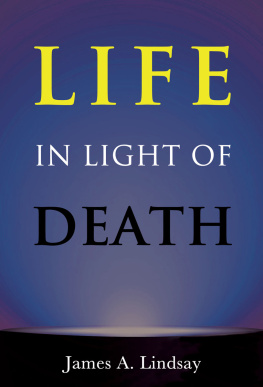Managing Death
Managing Death
James M. Hoefler
First published 1997 by Westview Press
Published 2018 by Routledge
52 Vanderbilt Avenue, New York, NY 10017
2 Park Square, Milton Park, Abingdon, Oxon OX14 4RN
Routledge is an imprint of the Taylor & Francis Group, an informa business
Copyright 1997 Taylor & Francis
All rights reserved. No part of this book may be reprinted or reproduced or utilised in any form or by any electronic, mechanical, or other means, now known or hereafter invented, including photocopying and recording, or in any information storage or retrieval system, without permission in writing from the publishers.
Notice:
Product or corporate names may be trademarks or registered trademarks, and are used only for identification and explanation without intent to infringe.
Library of Congress Cataloging-in-Publication Data
Hoefler, James M.
Managing death / James M. Hoefler.
p. cm.
Includes bibliographical references and index.
ISBN 0-8133-2816-0 (hc)
1. Right to die. 2. Terminal careMoral and ethical aspects. I. Title.
R726.H564 1997
179.7dc21
97-2593
CIP
ISBN 13: 978-0-367-01030-0 (hbk)
For Gram
Every year, thousands of caregivers, hundreds of thousands of patients, and millions of family members are forced to deal with questions about what life-sustaining medical procedures should be started, withheld, or withdrawn near the end of life. These decisions tend to be made in haste and late in the dying process, without the benefit of having full information on choices and alternatives. Often, patients suffer a good deal more than necessary at the end of life as a result, and family members are left with a haunting sense of guilt about the decisions they finally made: Did we stop the use of technology too soon? Or did we let things drag on too long?
Patients, those who care for them, and members of the medical care team should and frequently do collaborate on end-of-life treatment decisions. But too often, these decisions are shaped by a flawed understanding of what is appropriate in such circumstances. As a result, doing everything possible until the very end becomes the default rulea rule that, when challenged, sometimes turns bedside discussions into courtroom deliberations.
There is widespread agreement among bioethicists, medical clinicians, legal experts, and religious leaders about what decision-making principles should apply as death approaches. This consensus holds that:
- Patients should be able to make any decisions they choose about what medical technology they will accept or refuse (whether they are terminally ill or not);
- If the patient is unable to make decisions for him- or herself, surrogatesfamily members or close friendsshould be fully empowered to step in and make decisions based on what they think the patient would want or what they believe would be in the patient's best interests;
- There should be no distinction between withholding and withdrawing treatment; it should be just as acceptable to stop treatment once started as it is not to start treatment in the first place;
- Artificially provided nutrition and hydrationtube feedingshould be thought of as a medical procedure that patients or their surrogates can decide to accept or forgo like any other medical treatment.
More often than not, frontline clinicians and members of the lay public are utterly unaware of these consensus principles; consequently, they act the way they think they are supposed to actbut fighting death at every turn, until the bitter, inevitable end.
In this book, I attempt to shed new light on the issues surrounding the difficult decisions that must be made as death draws near. By presenting and clarifying the essential elements of the "consensus position," this volume will, I hope, help those confronting such decisions make truly informed choiceschoices that take into account a broader range of options and reflect more humanity than is evident in the dying process most Americans suffer through today. The truth is that sometimes, perhaps often, the process of dying can be eased and even enhanced by a decision to shift from the medical technology of curing to the hands-on approach of caring. However, this truth cannot have much impact if the decisionmakers are unaware of it. Americans need to become empowered about death; we must know more about death if we are to make good decisions in the twilight of life. Most of us would prefer to die well, and it is hoped that Managing Death will help make that desire a reality.
James M. Hoefler
I am indebted to a number of people for their time, expertise, and encouragement as this book took shape. Let me begin by thanking Rosemarie Sherman, who was so kind and thoughtful in agreeing to share her story with me at a time in her life when she was still grieving deeply for her son. Thanks also to the many caregivers, administrators, judges, and lawyers who spoke with me about the subject of this bookthose directly involved in Joey Fiori's case and others. All of you are busy people who took the time to share your thoughts and insights with me openly, and for that I am grateful. I promised you all that our talks would be confidential, so a heartfelt but generic "thank you" will have to suffice.
Special thanks are due to Dr. Greg Lewis and Professor Norman Cantor, both of whom provided me with thoughtful comments and guidance at important junctures along the way. Feedback from Alan Meisel and encouragement from Sherwin Nuland were also very much appreciated. Of course, I alone remain responsible for any errors in fact or judgment that remain in the final copy.
Special thanks are also due to Joan Sherman, who, for the second time, has worked her magic with one of my sometimes plodding and circuitous manuscripts. It is hard to imagine what my work might look like if Joan did not help shape the final product in a very thoughtful and often substantive way. As always, other members of the Westview Press team were most supportive as well, especially Jennifer Knerr and Leo Wiegman.
Back on the home front, Judy Welch is deserving of mention; her cheerful assistance in gathering research materials was most appreciated. Thanks, as always, are due Vickie Kuhn for providing staunch support and an expert eye in all the various facets of the book-writing process. I am also indebted to the rest of my Dickinson College colleagues who together make this school such a stimulating and supportive place to work and teach.
Finally, thanks to my girlsSusan, Jill, and Jennyfor all the love and support they shower me with daily. It is a love that, as much as anything I can think of, gives purpose and meaning to this earthly life.
J.M.H.
The vast majority of Americans will die in hospitals or nursing homes, and most will pass through a state of incompetence before they die-a condition that will render them unable to make decisions about life-sustaining medical treatment. Some will be incompetent for only a few hours or days; others will spend their last months or years in a state ranging from profound confusion to complete unconsciousness. Inevitably, other individuals will be called on to make difficult decisions about prolonging the dying process and about the medical technology that will be used.








